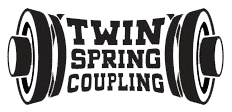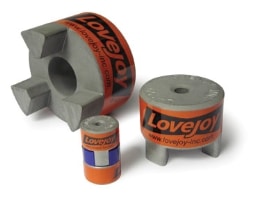Lovejoy vs T.B Woods: Choosing the Best Jaw Couplings for Industrial Machinery
Table of Contents
In industrial machinery, each part contributes to performance and efficiency—especially jaw couplings, which play a key role in transferring torque and absorbing shock between motor and driven shafts. For spare parts managers and maintenance professionals, Lovejoy and T.B. Woods are among the top choices in jaw couplings. Both brands are known for quality and durability, but how do their offerings compare? Here, we explore some of the best-selling models from each, looking closely at their specific advantages for different industrial applications.
The Importance of Jaw Couplings in Industrial Machinery
What are Jaw Couplings? Jaw couplings are flexible devices used to connect two shafts (usually motor and pump shafts) to allow for torque transmission while absorbing shock and minor misalignments. They’re crucial in industrial settings, as they protect machinery from wear and reduce vibration, leading to better overall performance.
Key Benefits of Using Jaw Couplings
- Efficient Torque Transmission: Suitable for high-torque applications, ensuring steady power flow.
- Shock Absorption and Vibration Reduction: Minimizes equipment wear, enhancing machine lifespan.
- Versatile Configurations: Available in numerous sizes and materials, allowing compatibility across various machines.
- Ease of Replacement: Their design allows for quick replacements, reducing downtime during maintenance.
Lovejoy Jaw Couplings: Features, Strengths, and Best-Selling Models
Lovejoy is a respected name in the industry, known for its high-quality elastomeric jaw couplings. Their couplings are versatile, easy to install, and built to withstand rigorous use in industrial environments.
Key Features of Lovejoy Jaw Couplings
- High-Grade Elastomer Materials: Lovejoy uses premium elastomers that offer excellent resilience and longevity.
- User-Friendly Installation: Lovejoy couplings are designed for quick installation, making maintenance simpler for busy teams.
- Flexibility and Shock Absorption: Lovejoy jaw couplings are engineered to accommodate slight misalignments and reduce vibration, helping to maintain smoother operation.
- Wide Range of Sizes and Configurations: The company offers a broad range of coupling sizes, covering applications from light-duty to heavy-duty machinery.
Top-Selling Lovejoy Models
- Lovejoy L-Series: The L-Series is known for its simplicity, offering effective torque transmission and shock absorption at a competitive price. It’s a favorite for moderate-duty applications.
- Lovejoy S-Flex Coupling: Featuring an elastomeric “sleeve,” this model provides increased flexibility and vibration damping, making it ideal for applications that need extra resilience.
- Lovejoy RRS Series: Known for high torque capacity and robust performance, the RRS Series is widely used in heavy-duty machinery, where durability is essential.
Best Applications for Lovejoy Couplings
Lovejoy jaw couplings are ideal for manufacturing facilities, water treatment plants, and conveyor systems. The L-Series and S-Flex models work well in applications requiring moderate torque transmission and shock absorption, while the RRS Series is suitable for more demanding uses.
T.B. Woods Jaw Couplings: Features, Strengths, and Best-Selling Models
T.B. Woods has a long-standing reputation for precision engineering and material strength in their jaw couplings. Known for durable construction, T.B. Woods products are frequently selected for heavy-duty applications where long-lasting performance is critical.
Key Features of T.B. Woods Jaw Couplings
- Precision Engineering: T.B. Woods couplings are built with accuracy, ensuring stable and reliable torque transmission.
- Premium Material Choices: Often made with metal alloys, T.B. Woods couplings withstand higher loads, which suits more intense industrial applications.
- Longevity in Demanding Applications: Engineered for durability, T.B. Woods jaw couplings are designed to last longer under constant, heavy loads.
- Advanced Misalignment Accommodation: These couplings can manage both angular and parallel misalignments, reducing the strain on connected machinery.
Top-Selling T.B. Woods Models
- T.B. Woods Sure-Flex Plus: This model is favored for its superior flexibility and torsional dampening, making it a popular choice for many industrial applications.
- T.B. Woods Form-Flex Couplings: Known for handling high-speed and high-torque applications, the Form-Flex series provides exceptional durability and performance under demanding conditions.
- T.B. Woods Dura-Flex Couplings: Dura-Flex couplings are designed to minimize vibration and extend machinery life, which is ideal for equipment that requires reliable performance in rugged conditions.
Best Applications for T.B. Woods Couplings
T.B. Woods jaw couplings are best suited for environments where high torque and load-bearing capabilities are necessary, such as mining operations, large-scale manufacturing, and heavy-duty conveyor systems. The Sure-Flex Plus and Dura-Flex models are well-suited for applications needing flexibility and vibration reduction, while the Form-Flex series is tailored for high-speed machinery.
Key Differences: Lovejoy vs. T.B. Woods Jaw Couplings
When comparing Lovejoy and T.B. Woods jaw couplings, it’s essential to consider factors such as durability, installation ease, application fit, and maintenance needs. Here’s a side-by-side look at some of the core differences between the two:
- Material Composition and Durability
- Lovejoy: Primarily uses elastomeric materials in their couplings, which are ideal for flexibility and shock absorption in moderate-duty applications.
- T.B. Woods: Often employs metal alloys and durable elastomers, which provide higher load capacities suitable for heavy-duty machinery.
- Ease of Installation and Maintenance
- Lovejoy: Known for a simpler installation process, ideal for applications where quick replacements are needed.
- T.B. Woods: Tends to require more precise installation but offers greater longevity, especially in high-load environments.
- Application Fit
- Lovejoy: Ideal for light to medium-duty applications, especially where shock absorption and flexible alignment are key.
- T.B. Woods: Suited for high-load, rugged environments where coupling durability and load-bearing are top priorities.
- Cost and Availability
- Lovejoy: Generally more cost-effective, making it a great choice for facilities needing frequent replacements.
- T.B. Woods: Tends to be pricier but offers a long lifespan, potentially saving costs over time.
Selecting the Right Coupling: Factors for Maintenance Managers
When deciding between Lovejoy and T.B. Woods jaw couplings, keep in mind these essential factors:
- Load Requirements: If your application demands high load capacities, T.B. Woods’ Form-Flex or Dura-Flex models are a great choice. For medium-duty applications, Lovejoy’s L-Series or S-Flex could be sufficient.
- Operating Environment: For high-vibration settings, Lovejoy’s elastomer-based models offer better resilience. For extreme conditions, T.B. Woods’ metal alloy models perform well.
- Maintenance Needs: Lovejoy couplings are simpler to install and maintain, while T.B. Woods couplings provide durability for equipment that requires less frequent servicing.
Best Practices for Maximizing Jaw Coupling Lifespan
Regardless of brand, following a few maintenances best practices can help maximize your jaw coupling lifespan and keep your machinery running smoothly:
- Regular Inspections: Periodically check couplings for wear, damage, or misalignment.
- Accurate Installation: Align components carefully to reduce stress on couplings.
- Replace Elastomer Inserts as Needed: For Lovejoy couplings, regular replacement of elastomer inserts is recommended.
- Lubrication: Ensure appropriate lubrication if required by the model specifications.
Lovejoy vs T.B Woods: Choosing the Best Jaw Couplings for Industrial Machinery
Final Verdict: Which Jaw Coupling is Best for Your Needs?
In conclusion, Lovejoy jaw couplings are a practical choice for light to medium-duty applications where flexibility and ease of replacement are valued. Their L-Series, S-Flex, and RRS models offer versatility and reliable performance for various settings. T.B. Woods jaw couplings, on the other hand, are ideal for heavy-duty applications. The Sure-Flex Plus, Dura-Flex, and Form-Flex models provide exceptional load-bearing strength and durability for demanding environments.
Search our range of Lovejoy jaw couplings here or TB Woods jaw couplings here
As a spare parts or maintenance manager, consider your specific requirements—such as load, environment, and maintenance preferences—to make an informed decision. Both brands have proven themselves in the industry, so understanding your machinery’s demands will help you select the most suitable option.

